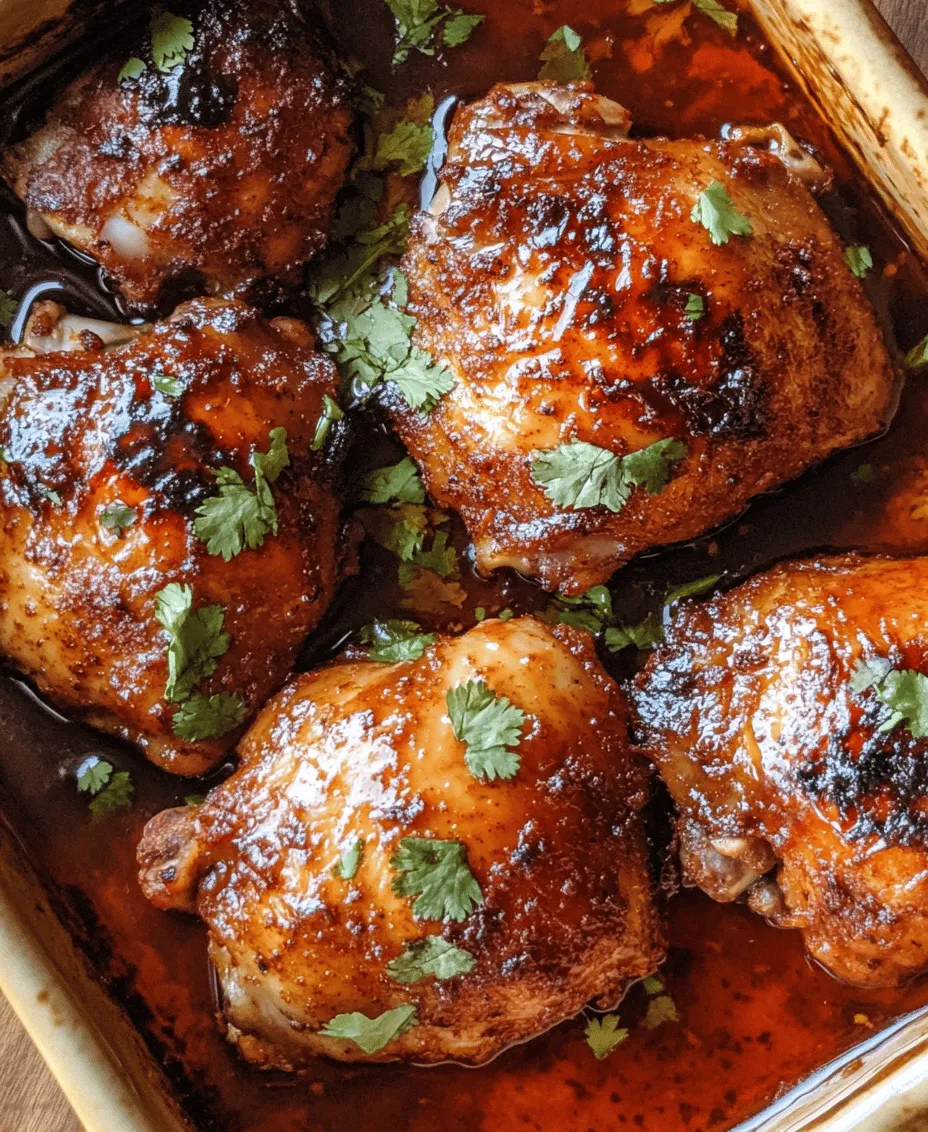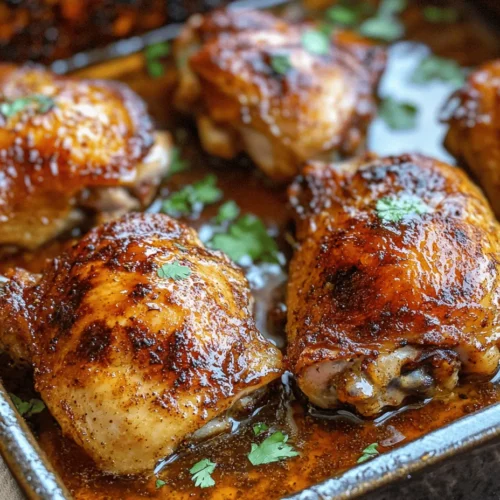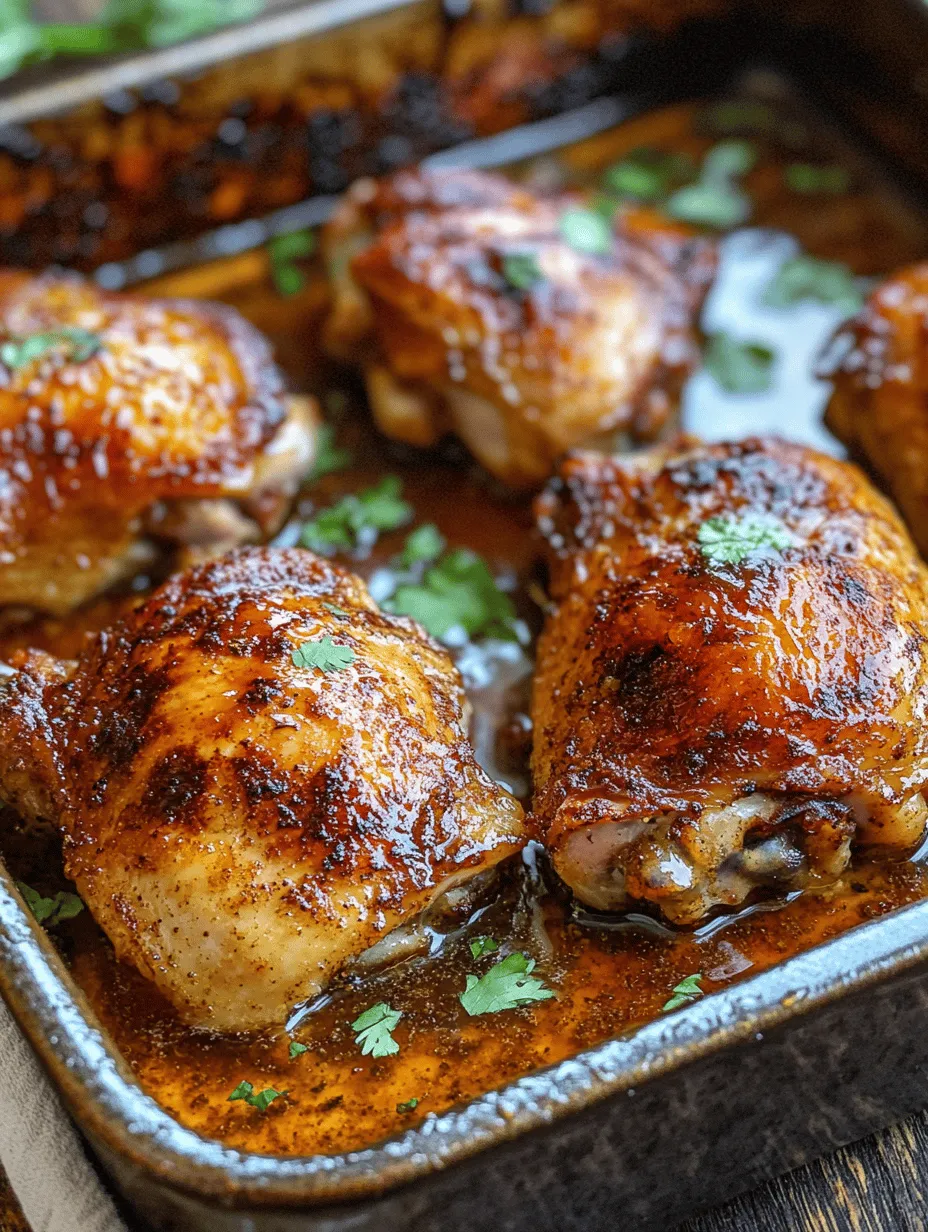Introduction
Moroccan cuisine is a vibrant tapestry of flavors, aromas, and colors, deeply rooted in a rich cultural heritage. From the bustling markets of Marrakech to the serene landscapes of the Atlas Mountains, the culinary traditions of Morocco are celebrated for their unique combinations of spices and ingredients. Central to this culinary art is the use of aromatic spices, which play a pivotal role in enhancing the flavors of dishes and creating an unforgettable dining experience.
Among the diverse array of ingredients celebrated in Moroccan cooking, chicken stands out as a versatile protein that adapts beautifully to various culinary traditions. Whether it’s served in a tagine, grilled on skewers, or roasted in the oven, chicken has a way of absorbing the bold flavors of spices, making it a favorite choice for many home cooks.
In this article, we will delve into the delightful world of Moroccan Spiced Chicken—a recipe that embodies the essence of Moroccan flavors. This dish is not only easy to prepare but also promises a symphony of tastes that will transport your palate to the heart of North Africa. With its harmonious blend of spices and succulent chicken, this recipe is perfect for weeknight dinners or special occasions alike.
The Essence of Moroccan Cuisine
Moroccan cooking is characterized by its intricate layering of flavors, often achieved through the use of a variety of spices and herbs. The cuisine reflects a fusion of influences, including Berber, Arab, and Mediterranean traditions. One of the defining features of Moroccan dishes is the use of spices such as cumin, coriander, saffron, cinnamon, and paprika—each contributing its distinctive flavor profile.
In Moroccan culture, spices are not just culinary ingredients; they hold cultural significance and are often associated with health benefits. For instance, cumin is known for its digestive properties, while cinnamon is celebrated for its antioxidant effects. The use of spices in Moroccan cooking extends beyond mere flavor enhancement; it is a celebration of the country’s agricultural bounty and a testament to its historical trade routes.
The aromatic spices used in Moroccan cuisine are often combined with fresh herbs like cilantro and parsley, creating a vibrant contrast to the rich flavors of meat and vegetables. The result is a culinary experience that is both comforting and exotic, inviting diners to explore a world of taste.
Ingredients Breakdown
To create a truly authentic Moroccan Spiced Chicken, a carefully curated selection of ingredients is essential. Each component contributes to the overall flavor profile, ensuring that the dish is both rich and satisfying. Below is a detailed breakdown of the ingredients used in this recipe:
Chicken Thighs
For this recipe, bone-in, skin-on chicken thighs are preferred. This choice is intentional, as the bone and skin help retain moisture during cooking, resulting in tender and juicy meat. Chicken thighs are also more flavorful than chicken breasts, making them an excellent choice for absorbing the spices used in this dish.
Olive Oil
Olive oil serves as the base for the marinade, contributing richness to the dish. It’s also a healthier fat choice, known for its heart-healthy properties. The oil helps to carry the flavors of the spices into the chicken while adding a touch of Mediterranean flair.
Spices
The heart of Moroccan Spiced Chicken lies in its bold spice blend.
– Cumin: This warm spice adds earthy notes and is known for its digestive benefits.
– Coriander: With its citrusy undertones, coriander complements the other spices beautifully.
– Cinnamon: This sweet and aromatic spice adds depth and complexity to the dish.
– Paprika: Offering a mild heat and vibrant color, paprika is a staple in Moroccan cooking.
– Cayenne: For those who enjoy a kick of heat, cayenne pepper can be adjusted according to taste.
Garlic
Garlic is a must-have ingredient that infuses the marinade with its pungent flavor. It enhances the aromatic quality of the dish and pairs well with the spices.
Lemon
Fresh lemon juice brightens the flavors and adds acidity to balance the richness of the chicken. The citrus notes elevate the dish, making it vibrant and refreshing.
Honey
A touch of honey adds a subtle sweetness that complements the spices and balances their heat. It also helps in caramelizing the chicken during roasting, creating a beautiful golden crust.
Chicken Broth
Using chicken broth in the roasting process ensures that the chicken remains moist and flavorful. The broth adds an extra layer of taste, infusing the chicken with savory goodness.
Ingredient Substitutions
For those with dietary preferences or restrictions, there are several possible ingredient substitutions. Chicken breasts can be used instead of thighs for a leaner option, but be mindful that they may require less cooking time. For a vegetarian adaptation, consider using hearty vegetables such as cauliflower or eggplant, marinated in the same spices, or try chickpeas for added protein.
Step-by-Step Guide to Marinating Chicken
Marinating chicken is a crucial step that transforms this dish from simple to spectacular. It allows the spices and flavors to penetrate the meat, enhancing the overall taste and making it more enjoyable. Here’s how to create the perfect marinade for Moroccan Spiced Chicken:
Importance of Marinating
Marinating chicken not only infuses flavor but also helps to tenderize the meat. The acid from the lemon juice breaks down proteins, resulting in a more succulent texture. A well-marbled chicken thigh absorbs the marinade beautifully, ensuring that every bite is packed with flavor.
Creating the Marinade
To prepare your marinade, combine the following ingredients in a bowl:
– 1/4 cup of olive oil
– 3 cloves of minced garlic
– The juice of 1 lemon
– 2 tablespoons of honey
– 1 tablespoon of ground cumin
– 1 tablespoon of ground coriander
– 1 teaspoon of ground cinnamon
– 1 teaspoon of paprika
– 1/2 teaspoon of cayenne pepper (adjust to taste)
– Salt and pepper to taste
Whisk these ingredients together until well combined. The consistency should be somewhat thick, allowing it to cling to the chicken. If it’s too thick, a splash of chicken broth or additional olive oil can be added to achieve the desired consistency.
Suggested Marination Times
For optimal flavor absorption, marination times can vary. Ideally, allow the chicken to marinate for at least one hour, but for the best results, marinating overnight is recommended. This allows the spices to meld together and fully penetrate the meat, resulting in a more flavorful dish.
Preparing for Roasting: Optimal Techniques
Once the chicken has marinated, it’s time to prepare for roasting. The right cooking techniques are vital to ensure that your Moroccan Spiced Chicken turns out perfectly every time.
Preheating the Oven
Before you begin the roasting process, it is essential to preheat your oven to 425°F (220°C). This high temperature is key to achieving a crispy skin while keeping the meat moist and tender. Preheating allows the chicken to cook evenly, ensuring that the exterior gets a beautiful golden brown while the interior remains juicy.
Placing the Chicken in the Baking Dish
When you are ready to roast, remove the chicken from the marinade, allowing any excess marinade to drip off. Arrange the chicken thighs skin-side up in a large baking dish. This positioning allows the skin to crisp up beautifully while the meat cooks evenly.
Adding Chicken Broth
Next, pour 1 cup of chicken broth into the baking dish, surrounding the chicken without covering it. The broth will not only help maintain moisture during the roasting process but also create a flavorful base for any pan sauce you may wish to prepare afterward. As the chicken roasts, the broth will infuse the meat with additional flavor while preventing it from drying out.
With these steps completed, your Moroccan Spiced Chicken is ready to be roasted to perfection. Keep an eye on the cooking time, and you’ll soon be savoring a dish that captures the essence of Moroccan culinary artistry.

Roasting the Chicken to Perfection
When it comes to roasting chicken, moisture is key to achieving a tender and juicy outcome. The Moroccan Spiced Chicken recipe relies on a blend of spices that not only infuses flavor but also works to keep the meat moist. The initial searing of the chicken helps lock in the juices, while the roasting process continues to enhance that moisture, producing a succulent dish that’s bound to impress.
To roast your chicken to perfection, follow these detailed instructions:
1. Preheat the Oven: Begin by preheating your oven to 425°F (220°C). A higher temperature is crucial for achieving that desired crispy skin while ensuring the inside remains tender.
2. Prepare the Roasting Pan: Place your marinated chicken in a roasting pan with a rack. The rack elevates the chicken, allowing hot air to circulate around it, which helps to cook it evenly and keeps the skin crispy.
3. Roasting Time: Roast the chicken in the preheated oven. A good rule of thumb is to roast for about 20 minutes per pound. For example, if your chicken weighs 4 pounds, it will take roughly 80 minutes. However, it’s essential to keep an eye on it as cooking times can vary based on your oven’s efficiency.
4. Monitor the Temperature: The best way to tell if your chicken is done is by using a meat thermometer. Insert the thermometer into the thickest part of the thigh, avoiding the bone. The internal temperature should reach 165°F (75°C). Once it does, you can be confident that your chicken is safely cooked through.
5. Crispy Skin: Achieving crispy skin requires a bit of care. Basting the chicken with its own juices every 20-30 minutes not only adds flavor but also helps to keep the skin from drying out. Use a spoon or a baster to drizzle the juices over the skin. This step is particularly important if you are using a higher temperature for roasting, as it helps maintain moisture.
Resting and Garnishing the Chicken
Once your Moroccan Spiced Chicken is beautifully roasted and has reached the correct internal temperature, it’s time to let it rest. Resting is a crucial step that should not be overlooked.
Why Resting Matters: Allowing your chicken to rest for at least 10-15 minutes before carving is essential. This period lets the juices redistribute throughout the meat, enhancing the flavor and ensuring that each bite remains juicy. If you carve the chicken too soon, the juices will escape, leading to a dry outcome.
Garnishing Ideas: For a vibrant and fresh touch, garnish your Moroccan Spiced Chicken with chopped fresh cilantro. Not only does cilantro add a burst of color, but it also complements the spices beautifully, enhancing the overall flavor profile of the dish. You can also add lemon wedges on the side for a citrusy kick, which balances the spices perfectly.
Presentation Tips: When serving, consider arranging the chicken on a large platter. Surround it with colorful sides or a bed of fluffy couscous to create an inviting presentation. Drizzle some of the leftover pan juices over the chicken for added richness, and don’t forget to sprinkle some extra fresh herbs for that final touch.
Serving Suggestions for a Complete Meal
To elevate your Moroccan Spiced Chicken into a complete meal, consider pairing it with traditional Moroccan side dishes that enhance the flavors of this dish.
Accompaniments:
1. Couscous: A classic choice, couscous is quick to prepare and can be flavored with spices, herbs, and even dried fruits like raisins or apricots for sweetness.
2. Moroccan-Style Salad: A fresh salad made with diced cucumbers, tomatoes, red onion, and a lemon-olive oil dressing complements the spices in the chicken. You might also add chickpeas for protein and texture.
3. Roasted Vegetables: Seasonal roasted vegetables, such as carrots, zucchini, and bell peppers, can add color and nutrition to your meal.
4. Hummus and Flatbread: For a more casual approach, serve with hummus and warm flatbread. The creamy texture of the hummus pairs wonderfully with the spiced chicken.
Creating a Moroccan-Inspired Experience: Set the table with vibrant textiles and serve the meal family-style, encouraging everyone to share and enjoy together. A traditional Moroccan meal often centers around communal dining, and this can enhance the experience. Consider serving mint tea for a refreshing finish to your meal.
Nutritional Information and Health Benefits
Understanding the nutritional content of your meal can enhance your cooking experience, particularly with a dish as rich in flavor and spices as Moroccan Spiced Chicken.
Nutritional Breakdown:
– Calories: A serving of Moroccan Spiced Chicken (approximately 4 oz) contains about 250-300 calories, depending on the cooking method and the amount of skin left on.
– Protein: Chicken is an excellent source of lean protein, providing around 30 grams per serving, which is essential for building and repairing body tissues.
– Vitamins and Minerals: This dish is rich in B vitamins, particularly niacin and B6, which support metabolism and energy production. The spices used, such as cumin and coriander, also contribute small amounts of iron and magnesium.
Health Benefits of Spices: The spices in Moroccan cuisine are not just for flavor; they also offer numerous health benefits. For instance:
– Cumin is known for its digestive properties and may help improve gut health.
– Turmeric, with its active compound curcumin, has potent anti-inflammatory properties and is linked to various health benefits, including improved brain function and reduced risk of chronic diseases.
– Cinnamon can help regulate blood sugar levels and has antioxidant properties.
The combination of these spices, along with the protein-rich chicken, creates a balanced meal that offers both flavor and nutrition.
Conclusion
In summary, Moroccan Spiced Chicken is not just a meal; it is an experience that connects you with the rich culinary traditions of Morocco. This recipe combines a harmonious blend of spices that not only tantalize the taste buds but also offers healthy benefits, making it a perfect choice for a weeknight dinner or a special gathering.
As you explore the vibrant flavors of Moroccan cuisine, don’t hesitate to try other recipes that incorporate similar spices and cooking techniques. Cooking is a joyful endeavor that brings people together, and sharing meals inspired by global flavors can deepen connections and create lasting memories. So gather your loved ones, whip up this Moroccan Spiced Chicken, and embark on a culinary journey that celebrates the joy of cooking and sharing.



